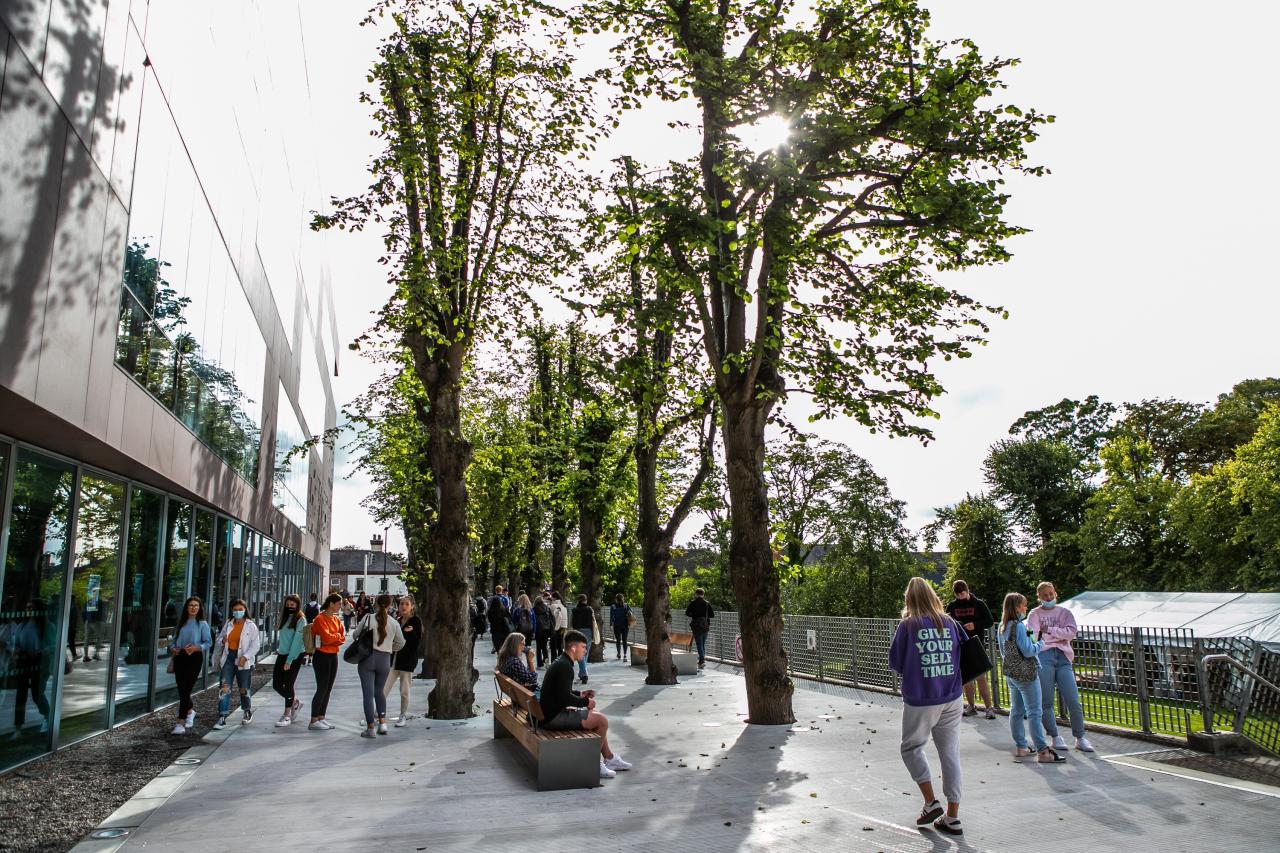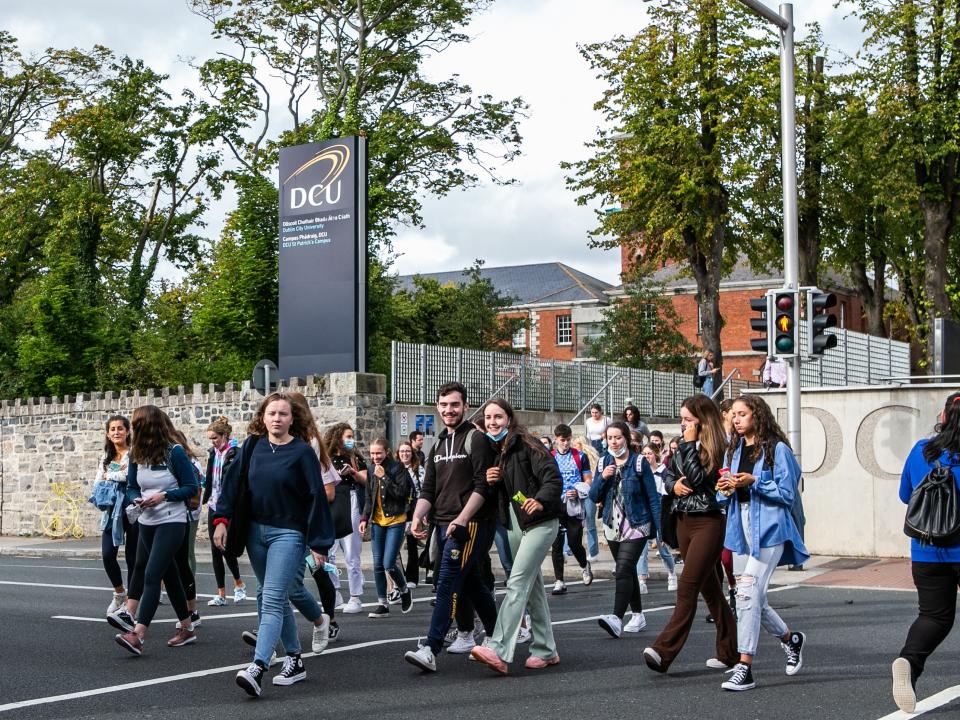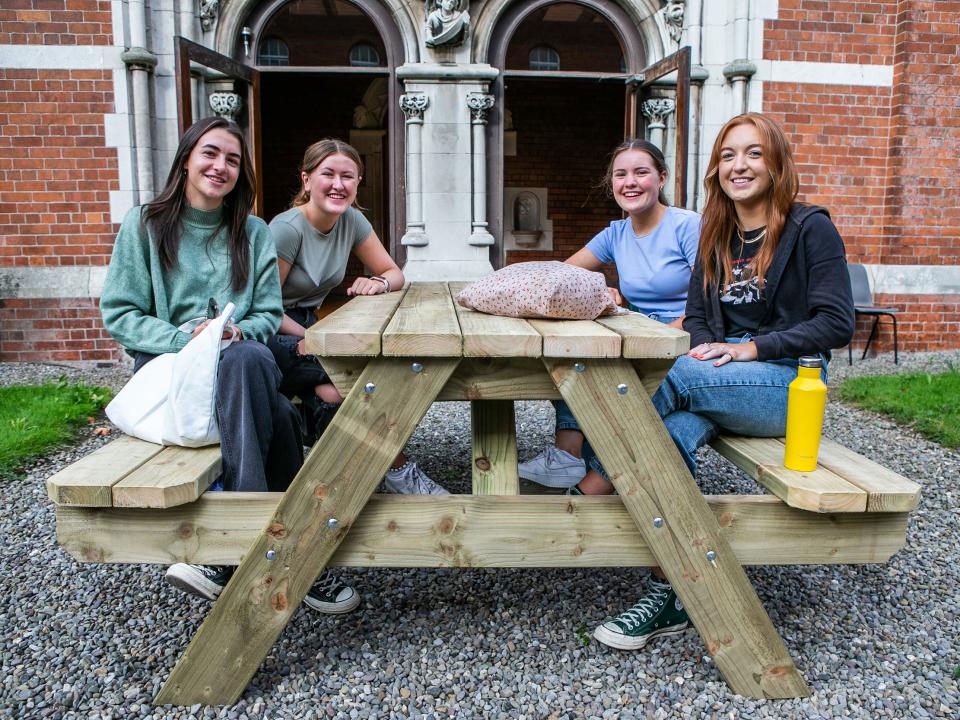Overview
As a primary school teacher, you can make a real difference - guiding and supporting children’s growing minds and personal development. This course will help you to become a skilled and creative teaching professional.
Learning to Teach, Teaching to Learn
The Bachelor of Education (Primary Teaching) will equip you not only with subject knowledge, but also with the leadership and communication skills that teachers need.
The course helps you to understand how children learn, and gives you the tools to motivate your students in the classroom. As well as learning how to teach the subjects on the primary school curriculum, your knowledge and understanding of the world will deepen through great interactive lectures.
Why DCU
DCU People
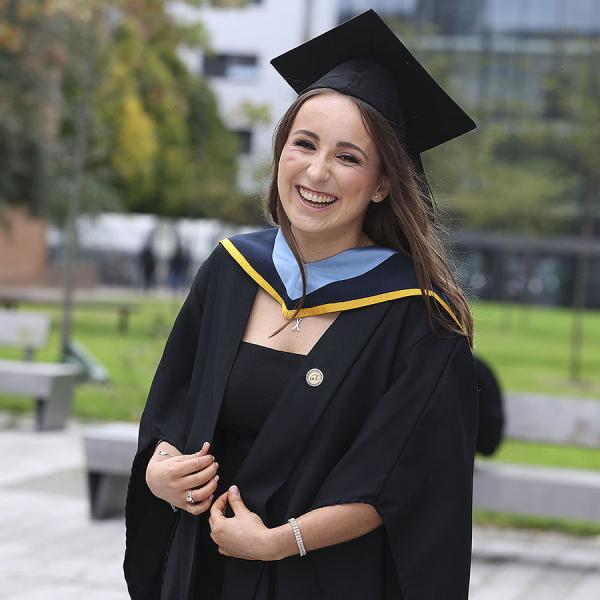
Caithlin brought her skills and experience as a hip-hop dancer to her Bachelor of Education course, and says the degree “really is setting you up for the rest of your career.”
Read more about Caithlin Stamp
Careers & Further Options
Careers
The Bachelor of Education degree is not only a gateway to the primary teaching professions, but also to a number of careers as outlined below
- Development Agencies
- Government Departments
- National Voluntary Organisations
- Primary Schools
- Statutory Bodies
DCU graduates are highly sought after by employers. Our Graduates work in environments ranging from large multinationals to SMEs, family businesses and start-ups across every sector.
DCU Careers Service has a number of learning and development initiatives in place for our students, giving them the skills they need for a successful career path.
Entry Requirements
In addition to the general entry requirements for admission to the university the following entry requirements apply: Minimum of H5 in no fewer than three subjects and a minimum of O6 or H7 in three other subjects, to include minimum of H4 in Irish; O4 or H7 in English; O4 or H7 in Mathematics.
Minimum age of 16 by 15th January in the year of entry.
DES 2025 entry requirements for non-mature applicants available here (Irish version here).
In addition to the general entry requirements for admission to the university the following entry requirements apply: Six subjects must be presented, at least three at GCE A Level with the remaining subjects at GCE AS or GCSE Level. Applicants must present the following subject requirements: GCSE Level C in both English and English Literature or GCSE Level B in either English or English Literature. GCE A Level C in Irish; GCSE Level D in Additional Mathematics or GCSE Level C in Mathematics; GCE A Level C in two further subjects; GCSE C in one other subject.
Minimum age of 16 by 15th January in the year of entry.
DES 2025 entry requirements for non-mature applicants available here (Irish version here).
No Entry Path
Mature applicants must apply to CAO by 1st February. In March, those meeting the eligibility criteria will receive an email from the CAO with a link to a supplementary form and instructions for completing and submitting this form. Applicants who meet the eligibility criteria and complete the supplementary form will be invited to attend a general interview and oral Irish test. Interviews/oral Irish exams will take place on Wednesday, 7th May 2025.
Applicants for this programme must meet the eligibility criteria as set out by DES* here. (Irish version here).
Minimum of H5 in no fewer than three subjects and a minimum of O6 or H7 in three other subjects, to include minimum of H4 in Irish; O4 or H7 in English; O4 or H7 in Mathematics.
No Entry Path
International candidates are expected to have educational qualifications of a standard equivalent to those outlined above. In addition, where such candidates are non-native speakers of the English language they must satisfy the university of their competency in the English language. For further information on international applications click here.
Course Structure
In Years 1 and 2, students cover the basics needed for teaching.
You will come to understand how children think and learn in active ways. Your curriculum courses will prepare you to teach all the subjects of the primary curriculum using approaches that develop children’s understanding and motivation.
You’ll also take modules in Psychology, Philosophy Sociology of Education and History of Education.
In Year 3, you will review what you’ve learned to date and will apply it in different situations.
Your understanding of classroom contexts and of how to plan for rich learning experiences will be enriched.
You’ll learn how to work with children in ways that are democratic and enable them to engage in an ethical way with the world.
Year 4 focuses on deepening your expertise. It will provide you with opportunities to think about big ideas in education such as social justice, inclusion and working in a school community. You will also undertake a research project.
Learners spend time in schools in each year, with extended placements in Years 3 and 4. You will start by observing the class teacher and will build up gradually to teaching all day. You will also visit the Gaeltacht for four weeks.
Specialise
The BEd also enables you to specialise in key areas of learning.
In Year 1 you’ll select a maximum of three from English, Gaeilge, Geography, History, Mathematics, Music, and Religious Studies. You can continue with one of these as a Major Specialism in Years 2 to 4.
Alternatively, you may decide to opt for Early Childhood Education, Digital Learning, Science Education, Human Development, Physical Education, Literacy Education, Geo Learning, or Special and Inclusive Education. (The number of places on some specialisms is restricted and options are subject to change).
Fees and Funding
Fees
How To Apply
Applicants presenting EU School Leaving examinations: Apply through the Central Applications Office (CAO) by 1st February or 1st May
To apply for this programme:
Candidates should apply directly here. Here's a quick step by step guide if you need help with your application.
Please provide
- Academic Transcripts for each and every year of study with English translation, if applicable.
- If applicable, provide evidence of competence in the English language as per DCU entry requirements.
Applications are accepted on an ongoing basis up to 1st July. All Non-EU candidates are advised to apply early, as places are limited.
Apply through the CAO by 1st February. In March, those meeting the eligibility criteria; those intending to sit the Leaving Certificate and applicants presenting GC(S)E in 2025 must complete a supplementary form. All eligible applicants will be contacted and sent a supplementary form which must be completed and returned. Candidates will then be invited to attend a general interview and oral Irish examination which will take place one after the other via zoom. Interviews/oral Irish exams will take place on Wednesday, 7th May 2025.
Applicants sitting examinations in 2025 will be included in this invitation provided they meet the minimum entry requirements or are intending to sit Leaving Certificate/GC(S)E examinations before August 2025.
Applicants will be offered places in order of merit. Candidates who have failed the interview on two previous occasions are not eligible to reapply.
Please note that mature applicants can apply either on mature grounds or on points alone or both.
Information regarding the DES 2025 Mature Entry Requirements is available here. (Irish version here).
No Entry Path
Please see Application Procedures or E-mail ugadmissions@dcu.ie.
Candidates required to apply through the CAO can apply online at www.cao.ie
Life On Campus
At DCU, our students can expect a unique campus experience. We are known for our excellent teaching and learning facilities, our active clubs and societies, and our great social and sporting facilities. All this makes DCU an exciting place to be.
DCU has three academic campuses; Glasnevin, St. Patrick’s and All Hallows (both in Drumcondra), all close to Dublin City centre.
They can be reached by public transport, Dublin Bus and Bus Éireann, with our Drumcondra campuses a ten minute walk from Drumcondra Train Station. Glasnevin is a 20 minute walk from St Patrick’s and All Hallows. They are also linked by Dublin Bus.
Each campus has a library (O’Reilly, Cregan and Woodlock Hall), study spaces, restaurants, and on-campus residencies. There are sports facilities on Glasnevin and St. Patrick’s, and there is a dedicated sports campus, St Claire’s, located near Glasnevin on the Ballymun Road.
DCU’s 19,000 students have access to exceptional teaching and learning facilities across our three academic campuses.
These include modern learning theatres, research centres, a new media and TV studio, radio/podcast studios, computer suites and advanced labs in the areas of Languages, Engineering, Physics, Chemistry and Biotechnology, as well as a Sports Performance centre and a training hospital ward. In 2021, we opened our first virtual reality ‘Leadership Lab’, which is located in our Business School.
We continue to improve and update our facilities. For example, construction of a new world-class STEM facility is underway on the Glasnevin campus. With capacity for an extra 3,000 STEM students, this facility will advance DCU’s international reputation for excellence in science and health, computing and engineering disciplines.
Studying in DCU isn’t just about course work. The university is rich in student life and activities.
There are more than 140 clubs and societies for students in DCU, with ‘Clubs & Socs’ days taking place on both the Glasnevin and Drumcondra campuses at the start of the academic year. They span everything from rugby to rock climbing, anime to jazz.
For many students, sport is an important part of the DCU experience. DCU’s Sports Complex boasts a 25 metre swimming pool, fitness centre gym, all-weather pitches and squash courts, as well as soccer, GAA and rugby pitches. DCU Dóchas Éireann, the university’s GAA club, is the largest third level Gaelic Games club in the country. Meanwhile, DCU Athletics has been Ireland’s highest achieving university club for many years. And DCU has dozens of other clubs to get involved in, from Archery to Weightlifting.
The Glasnevin campus is home to our purpose built, state-of-the-art student centre, The U, which serves the needs of a rapidly growing student body. Here, you will find the Student Leadership and Lifeskills Centre, performing arts and cultural spaces for students and the wider community, and the Entrepreneurship and Innovation Hub. Also located on our Glasnevin campus is The Helix, our renowned performing arts centre.
On our St Patrick’s campus, we have the Java Student Hub, a vibrant, warm and welcoming space where students can meet for coffee, play music, use the projector to watch events, or just relax. The walls of the Java Hub were designed based on the cultural history of St Patrick’s Campus, including the special references to the notable sporting history and history of the arts.
We have a number of academic, professional and social supports for students.
Student Advice & Learning Skills Centre - Offers a wide range of supports and services to students and advice
The Writing Centre - drop-in writing workshops for students through the academic year
Maths Learning Centre - provides maths support for students of all ability levels with maths modules
Student Learning - facilitate the transition from passive to active learning for students at DCU, by teaching study skills, nurturing critical thinking and building student confidence.
Careers work with students to help them on their professional journey into graduate employment.
Our student support team offers a comprehensive support programme, helping students make that all important transition into university life and focusing on building confidence and skills which are key to success at third level.
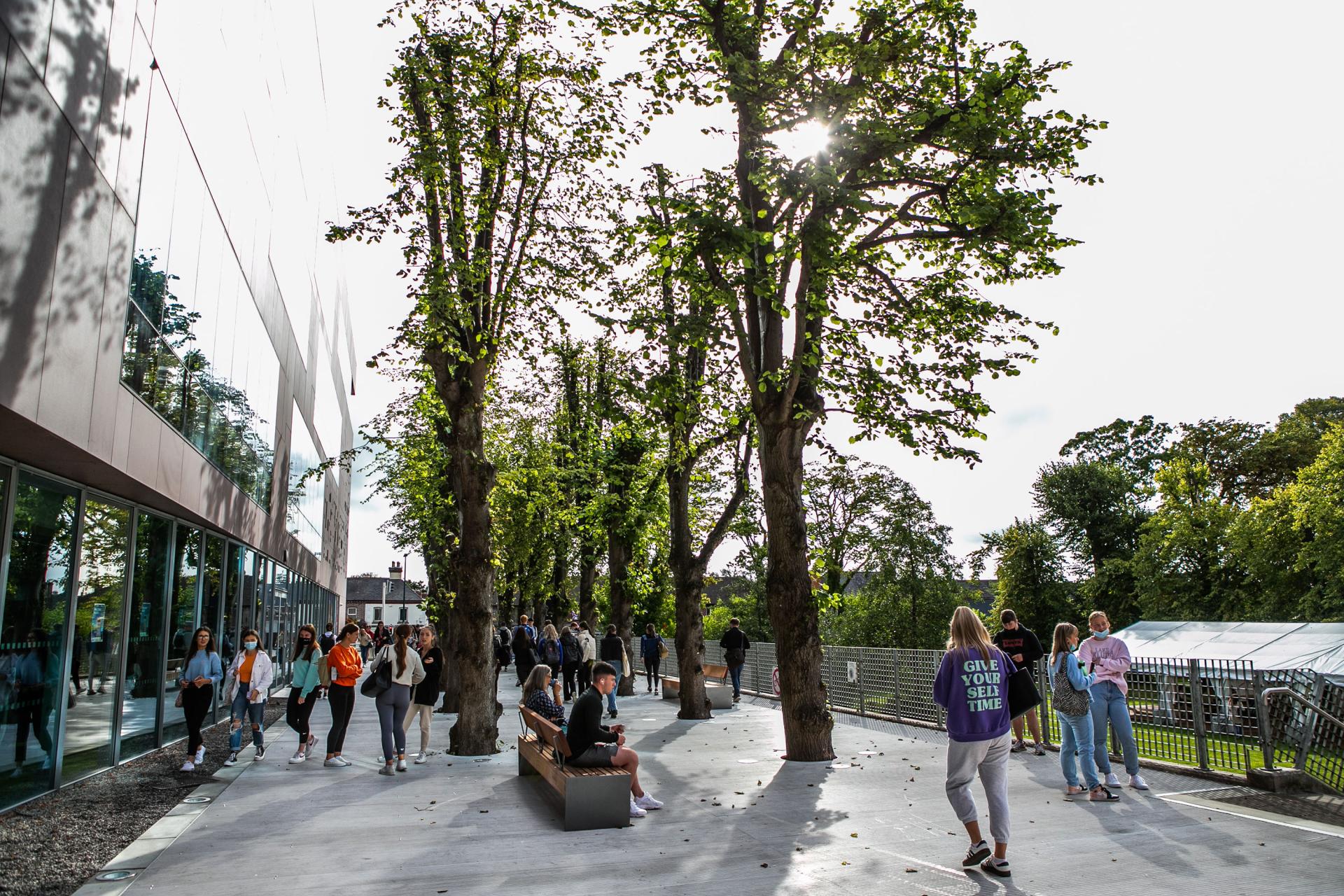
DCU St Patrick's Campus
FAQs
What courses are offered by the DCU Institute of Education?
DCU Institute of Education brings together students of education and provides a rich menu of undergraduate courses across all sectors from early childhood, to primary and post-primary and further and higher education. We offer a range of taught and research postgraduate courses at doctoral, masters, diploma and certificate level and have a distinguished record in providing continuing professional development.
Is there Garda vetting for students who study DCU Institute of Education courses?
Garda vetting is required for all students who have unsupervised access to children and vulnerable adults as part of their studies at DCU. Applicants must successfully pass the Garda vetting process in order to complete the registration process.
What are the potential teaching pathways for primary, post-primary and further education and training offered by DCU?
Primary Teaching Pathways
Undergraduate*
Postgraduate**
- Professional Master of Education (Primary Teaching) - DC970
* Please ensure that you consult minimum entry requirements and CAO points for all undergraduate programmes
** Please ensure that you consult minimum entry requirements for all postgraduate programmes
Post-Primary Teaching Pathways
Undergraduate*
- Bachelor of Religious Education & English or History or Music - DC010 | DC011 | DC012
- Bachelor of Education in Gaeilge and French or German or Spanish - DC013
- Bachelor of Education in Technology, Engineering and Graphics - DC015
- Bachelor of Science (Hons) in Science Education - DC203
- Bachelor of Science (Hons) in Physical Education with Biology - DC205
- Bachelor of Science in Physical Education with Mathematics - DC206
Postgraduate**
- Professional Master of Education (Post-Primary Teaching) - DC905
* Please ensure that you consult minimum entry requirements and CAO points for all undergraduate programmes
** Please ensure that you consult minimum entry requirements for all postgraduate programmes
Further Education and Training Teaching Pathways
Undergraduate*
- BSc (Hons) in Education and Training (Further, Adult and Continuing Education) - DC235
* Please ensure that you consult minimum entry requirements and CAO points for all undergraduate programmes

